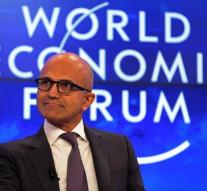

Fourth industrial revolution is changing society
- A mobile phone that is implanted in your head, 3D printed organs for transplantation. Clothing equipped with sensors that are connected to the Internet. It now seems something out of a science fiction movie, but in 2025 it is a scientific fact.
That forecast leaders from politics, science and industry who met today in Davos, Switzerland for the World Economic Forum (WEF). The central theme this year is the 'fourth industrial revolution.
After the steam engine, mass production and information technology, the latest industrial revolution revolves around the economic and social development through technology that will change the world rapidly.
Rapid innovation cycles enable businesses, employees, governments and communities facing major challenges. Cheaper goods and services promise a new wave of economic growth, but also threatens mass unemployment and further deterioration of the already strained trust between businesses and the public.
Satya Nadella, CEO of Microsoft, and this year co-chair of the WEF, pointed out in his speech that as a result of the fourth industrial revolution will create an economic surplus. 'The question is how evenly it is distributed between countries, between people of different economic strata and also in different parts of the economy. '
Robots are already moving from factories to homes, hospitals, shops and even war zones. One of the most requested participants at Davos this year is therefore not a central banker, CEO or politician, but the South Korean HUBO robot, a humanoid robot that can help in disasters.
The emergence of robots in both the manufacturing and services sectors, as well as self-propelled vehicles and innovations from startups ensure that many jobs are being automated. As predicted researchers from Oxford University in 2013 that 47 percent of jobs were at risk in the US.
Fear that jobs lost through technology is not new. The famous economist John Maynard Keynes warned in 1931 for a massive technological unemployment. The WEF now predicts that by 2020 more than 5 million jobs lost in 15 leading economies. But not everyone is pessimistic. 'If history is any indicator, then we will eventually create more jobs than lost,' said Jonas Prising, CEO of ManpowerGroup.


Leave a comment